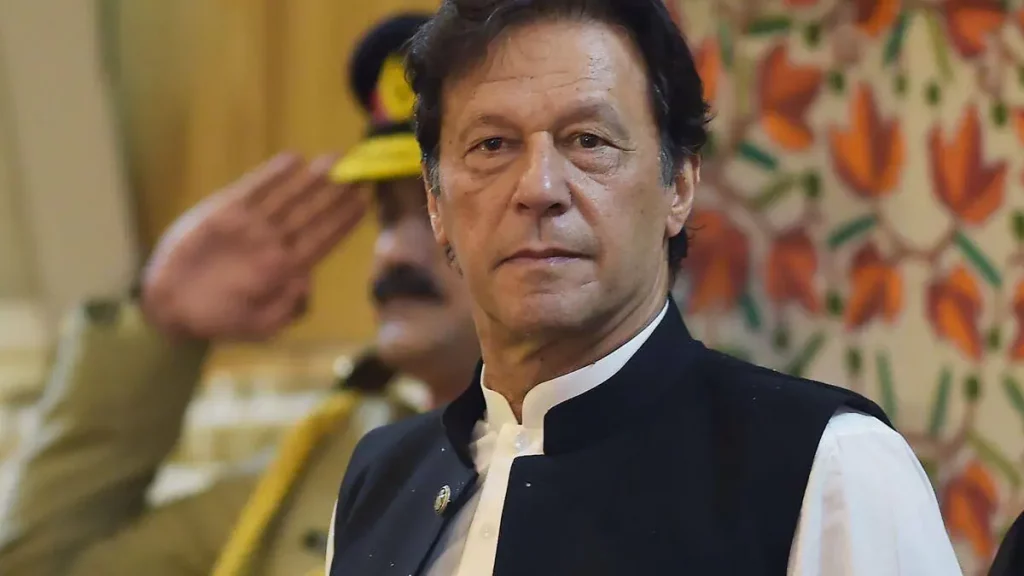Pakistani Prime Minister Imran Khan on Sunday won the dissolution of parliament and call for early elections within three months, after he narrowly avoided a motion of no-confidence in the opposition to oust him.
This dramatic shift comes as Imran Khan lost his parliamentary majority a few days ago, which is necessary to bypass the opposition’s censure motion, which accuses him of economic mismanagement and breach in foreign policy.
But on Sunday, at the opening of the session during which this proposal was to be studied, the deputy speaker of the National Assembly, Qasim Suri, a believer in Mr. Khan, created the surprise by announcing that he had refused to put it before the House of Representatives. Vote, by judging it “unconstitutionally”.
Opposition deputies received this news with anger and astonishment, and many of them refused to leave the hall.
“This date will be remembered as a black day in the constitutional history of Pakistan,” said Shahbaz Sharif, leader of the Pakistan Muslim League (PML-N), the favorite to replace Imran Khan if the censure motion succeeds.
Imran Khan, in a speech on state television minutes after salvaging his seat, denounced the “foreign interference” which he said had led to attempts to oust him from power, and announced that he was asking the President of Pakistan to dissolve the National Assembly.
The request was approved by President Arif Alvi, who holds honorary duties, in a step, resulting in early legislative elections within 90 days.
“We will appeal to the public, hold elections and let the nation decide,” Imran Khan said.
The former National Glory party in cricket, Pakistan Tehreek-e Insaf (PTI, Pakistan Justice Movement), lost its parliamentary majority last week when an allied party announced that its seven MPs would vote with the opposition. More than ten deputies from the PTI party also changed their positions.
Imran Khan on Saturday called on his supporters to demonstrate peacefully outside parliament and hinted he still had a card to play. “I have a plan for tomorrow, don’t worry. I will show them and I will defeat them in front of the devotees,” he promised.
Earlier this week, he accused the United States of interfering in Pakistani affairs. According to local media, he received a report from the Pakistani ambassador in Washington who recorded a senior US official telling him that relations between the two countries would be better if the prime minister left office. Washington denied.
Imran Khan again accused, on Sunday, the United States of wanting “regime change” in Pakistan because of its refusal to take sides with US positions towards Russia and China. “This betrayal was unfolding before the eyes of the whole country. The traitors were sitting there planning their plot,” he said, referring to the opposition.
Accused by his critics of poor economic management – ballooning inflation, a weak rupee and crushing debt – and of foreign policy clumsiness, Imran Khan, 69, is, at least for now, grappling with his most serious political crisis since his election in 2018.
The two main opposition parties, the Pakistan People’s Party (PPP) and the Pakistan Muslim League, dominated national politics for decades, with periods of power punctuated by military coups, until Imran Khan formed a coalition by promising voters in particular to annihilate decades. from corruption.
Some analysts believe that Imran Khan has lost crucial support for the military, the key to Pakistan’s political power. But it seems unlikely that his stunning recovery on Sunday could have taken place without the military’s knowledge, or even blessing, of the matter.
“The best option in this situation is to hold new elections to allow the new government to deal with economic, political and external problems,” said Talat Masoud, a former general turned political analyst.
Since independence in 1947, Pakistan has experienced at least four successful military coups and similar coup attempts, and the country has spent more than three decades under military rule.
No Pakistani prime minister has completed his term.

“Total coffee aficionado. Travel buff. Music ninja. Bacon nerd. Beeraholic.”






More Stories
Fluoroscopy | “Self-coup”?
This is why you find it difficult to wake up in the morning.
She meets her boss at the airport after taking sick leave.